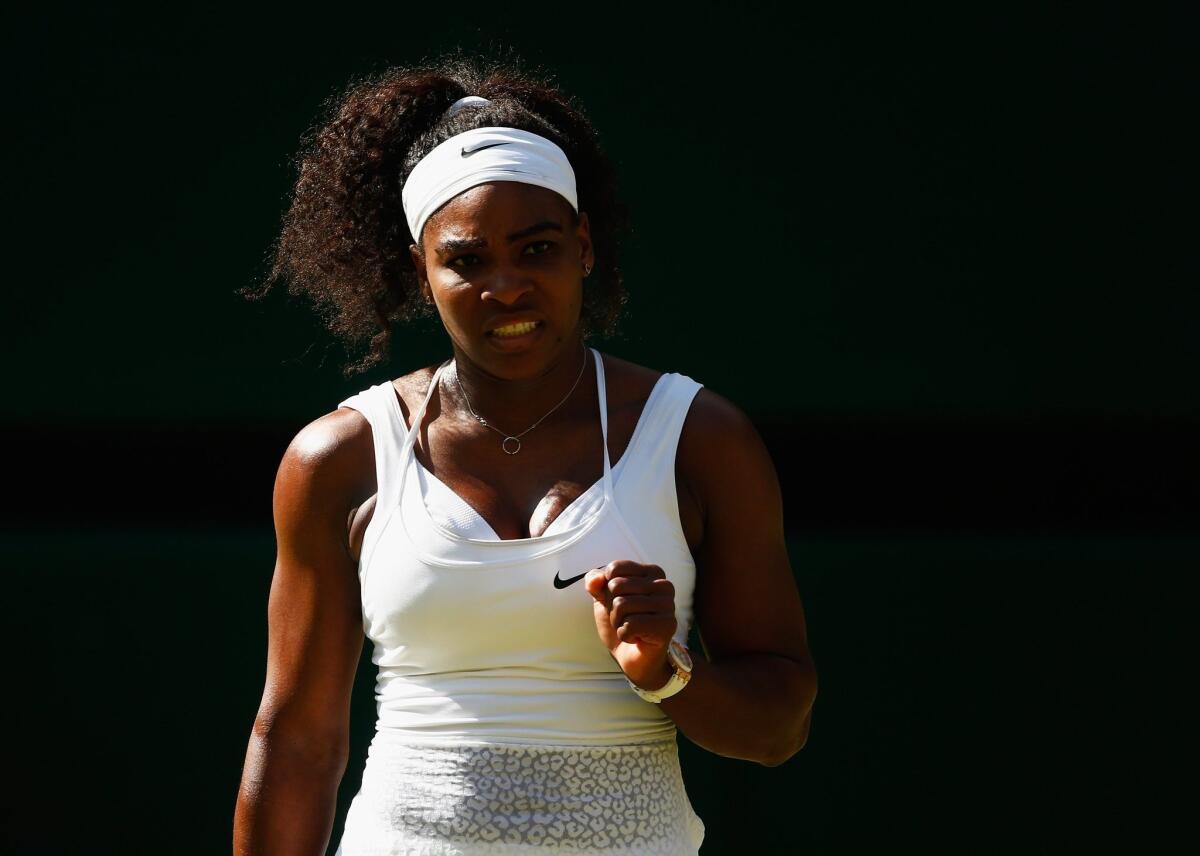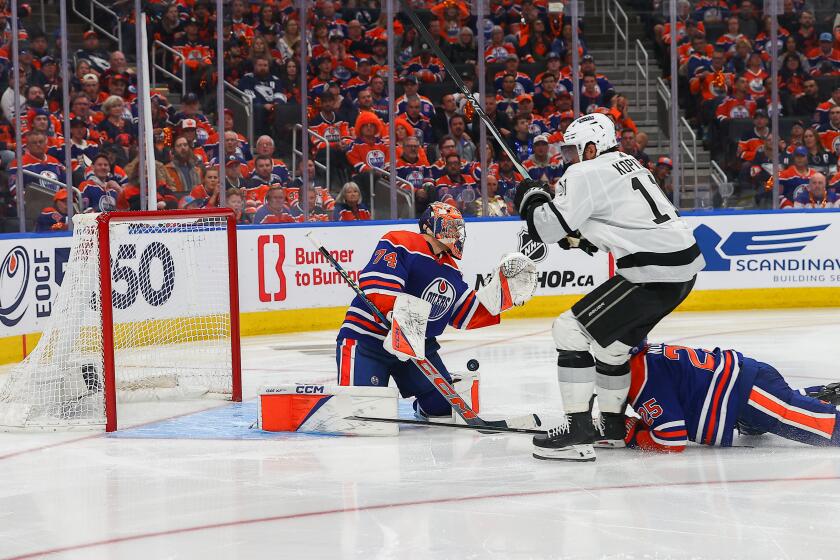Wimbledon: Serena Williams has plenty on the line vs. Garbine Muguruza

Serena Williams celebrates during her Wimbledon semifinal victory over Maria Sharapova on Thursday.
The hits just keep coming for Serena Williams, and on paper, Saturday’s Wimbledon final against Garbine Muguruza of Spain looks like another belaboring of the obvious.
Williams is No. 1 in the world. She has won 20 of these major titles, five of them on the very grass court on which she will face Muguruza.
Williams has refused to talk about her pursuit of a fourth straight Grand Slam tournament victory -- which would be her second “Serena Slam” -- and a Grand Slam in the same calendar year to match Steffi’s Graf’s modern era feat in 1988. But you can bet she thinks about it.
The only blips Williams has faced here, in her six matches leading to the final, were a contentious battle with Britain’s Heather Watson that went three sets and brought out a bit more spectator vitriol toward Williams than seemed warranted, and a hard-fought three-setter with Victoria Azarenka.
Her semifinal victory over Maria Sharapova was the continuation of an 11-year joke. In the 17 matches they have played in that time, Sharapova has mostly been a punching bag.
The destiny and future for Muguruza is less clear.
She is 20 years old and ranked 20th. Going into the match, she isn’t even the No. 1 women’s player in Spain, but that’s only because rankings don’t change until Monday of the next week. Spain’s top women’s player would be her doubles partner, No. 9 Carla Suarez Navarro. Muguruza will at least replace Suarez Navarro at that spot by virtue of getting to the final, and if she wins, she will become No. 6.
Williams will stay No. 1, no matter what happens in the final.
Muguruza actually has a victory, in three matches, against Williams. That was in the second round of last year’s French Open, and Williams made a good point about that match.
“She didn’t beat me and then lose,” she said. “She went on and had a tough match against Maria [Sharapova]. She got to the quarters again of the French [this year].
“She’s super young. I definitely see her as somebody to watch and be careful for, because she knows how to play. I think this probably is a good surface for her.”
Muguruza likely would not have agreed with that, until this run at Wimbledon. Previously, she called grass her least-favorite surface.
“For sure, my mentality is going to change,” she said Friday morning. “I’m changing every week. When I play good, I love this surface. When I’m playing bad, I hate this surface.
“I’m kind of like this.”
Williams was so dominating against Sharapova that she never allowed her opponent a break point and hit 13 aces.
Muguruza, who wasn’t even in the top 100 two years ago, is similar in playing style to Sharapova, hitting all-out on most points. But she lacks the experience of these big moments and that could be telling.
Among those having the best view of how this might go would be Agnieszka Radwanska, the Polish player who lost to Muguruza in a semifinal Thursday.
“I don’t think she [Muguruza] can beat Serena in the final,” Radwanska said. “I think Serena is not going to let her do that, no, not in this tournament.
“But I wish her luck.”
Marathon: Top-seeded junior Taylor Fritz of Rancho Santa Fe, Ca., was upset in Friday’s semifinals by another U.S. player, unseeded Reilly Opelka of St. Joseph, Mich., but it took a marathon tiebreaker to do it. The score was 6-3, 7-6 (13).
Federer’s appeal: The British newspapers were all a-flutter about Friday’s Roger Federer-Andy Murray semifinal, with the startling conjecture that Federer had become so popular here that the Centre Court fan base might just favor him over Murray, a Brit. The Times gave some perspective to that: “Federer is popular, but he is not George Clooney.”
Screech: The Times also did its best to characterize the ever-present controversy of the annoying loud screeching that has become such an integral part of Sharapova’s game, as it was in her semifinal loss to Williams on Thursday. Writer Matthew Syed, reporting her apparent frustration in her match with Williams, typed: “Even her shriek sounded plaintive, like a seagull unsure of where the next meal was coming from.”
Sharapova, quite touchy by now about discussing the decibel level of her game, reacted predictably when asked to address it in her news conference after her semifinal loss.
“Next question,” she said.
More to Read
Get our high school sports newsletter
Prep Rally is devoted to the SoCal high school sports experience, bringing you scores, stories and a behind-the-scenes look at what makes prep sports so popular.
You may occasionally receive promotional content from the Los Angeles Times.







